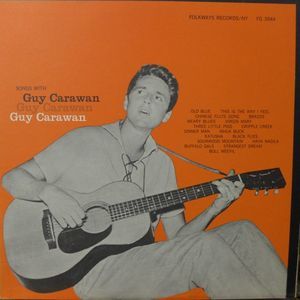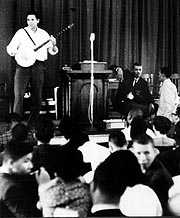 Guy Carawan, a folksinger, musician, ethnomusicologist and activist perhaps best known for introducing the anthemic protest song “We Shall Overcome” to the American civil rights movement during the 1960s, died in his sleep May 1 following a lengthy illness. He was 87.
Guy Carawan, a folksinger, musician, ethnomusicologist and activist perhaps best known for introducing the anthemic protest song “We Shall Overcome” to the American civil rights movement during the 1960s, died in his sleep May 1 following a lengthy illness. He was 87.
Born to Southern parents in California in 1927, Carawan earned a BA in mathematics from Occidental College in 1949 and a master’s degree in sociology from UCLA. However, he soon turned to music. During the 1950s, he met musicians engaged in the People’s Songs network and became involved with the folk music revival centered in New York’s Greenwich Village.
Carawan sang and played banjo, guitar and hammered dulcimer. He frequently performed with his wife, Candie. with whom he recorded many albums and folkloric collections. They lived near the Highlander Research and Education Center in New Market, Tennessee -– a training center for grassroots activists that integrates music with social change. He served as its music director and song leader for more than 50 years. Carawan had first visited Highlander, initially established as a resource center for labor organizers, in 1953 with singers Ramblin’ Jack Elliot and Frank Hamilton. He returned six years later, ostensibly to use the center as a base for research on Southern folk culture and music, and took the helm of its music program.
Carawan taught a group of college students at the Highlander Center his arrangement of “We Shall Overcome”, a union organizing song based on the negro spiritual “I’ll Overcome Someday” that Pete Seeger had taught him some years earlier. In April 1960, Carawan sang it to some 200 activists at an inaugural meeting of the Student Nonviolent Coordinating Committee (SNCC) at Shaw University in Raleigh, North Carolina – reportedly prompting the audience to stand, link hands and sing. It became the unofficial anthem of the civil rights movement. For their part, Carawan and his wife joined Rev. Martin Luther King, Jr. in marching through the streets of Selma, Alabama.A fervent believer in the use of spirituals and folk songs as a unifying force in the struggles for social change, Carawan also recorded and archived the evolution of the civil rights movement through song. An avid collector of freedom songs, he helped to document the music of not only that movement, but of coal miners and other trade unionists, and of Appalachian culture, through both books and recordings.
Along with his wife and family, Carawan spent time with the people of Johns Island, South Carolina documenting his experiences and the music in several books, as well as an album of field recordings. Similarly, he collected songs and stories from people in the Appalachian coal-mining region. “I’ve always just been interested in the richness of people’s cultures,” the folklorist once said.
Credited with helping to popularize the hammered dulcimer, Carawan introduced John McCutcheon and Malcolm Dalglish to the instrument. His son Evan also plays the hammered dulcimer, and they recorded a duo album of Appalachian Irish tunes on the stringed instrument in 1988. Besides recording his own albums, Carawan produced and played guitar on albums for other artists. He’s also written songs that have been performed by others.
In recognition of his lifetime commitment to social justice and his contributions to music and folklore, Occidental College, Carawan’s alma mater, bestowed an honorary degree on him in 2003. Six years later, he and Candie were honored with a Lifetime Achievement Award from what is now Folk Alliance International. Here’s a link to a short film by Scott Alarik that was screened during that presentation:
http://scottalarik.com/index.php?page=video&category=Folk_Films_by_Scott_Alarik&display=336


Like/Follow Us!